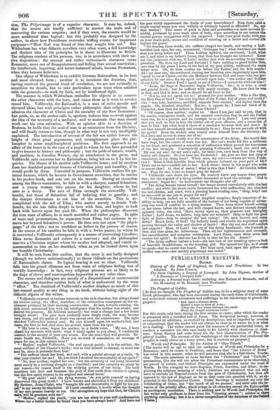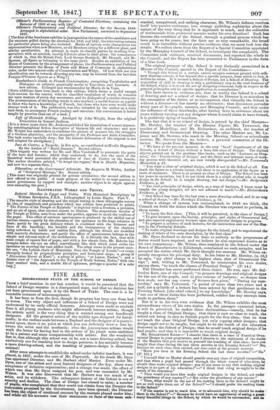PUBLICATIONS RECEIVED.
BOOKS.
History of the Bank of England, its Times and Traditions. In two volumes. By John Francis. The Slave Captain; a Legend of Liverpool By John Dignan, Author of "A Romance of Liverpool Life." Antwerp; a Journal kept there: including also Notices of Brussels, and of the Monastery of St. Bernard, near We.stmalle.
The Prophet of Galilee.
(At first we thought The Prophet of Galilee was to be a religious story of BOMB Greek philosopher, who had been converted during the early times of Christianity, and underwent various adventures and sufferings iu his wanderings to preach the
gospel— " Sad, upon a distant shore, limed a sage in time of yore ; 'Twas the time when through the earth Went the Gospel summons tnrth."
But this strain only lasts during the first section or canto; after which the reader is presented with a versified tale of Jonas. The Scriptural history, however, is so expanded by additions, so overlaid by descriptions, and so impeded by reveries or outpourings, that the reader will not always be clear as to where be is or what he is reading. The writer cannot paint the manners of the patriarchal times, or conduct a narrative (in this case ready to his hands) with clearness or close- ness. Great fluency and some fancy are the best characteristics of The Pro- phet of Galilee. The account of the wanderings of the whale that swallowed the prophet is really clever as a fancy- piece; but it answers no purpose.] Words and Principles. By the Author of " Glen Tilloch." [The reader will be apt to take the authoress of Words and Principles for a Romanist; until he comes to Tradition, and hears that "the Church of Rome" has erred in this matter, when he will perceive that she is a fall-blown Tracts- rian. The main questions at issue between the "Protestant" and "Catholic" persuasions, (for she will not allow the Protestant communions to be churches,) are passed in review, and Oxford Principles are expounded under the head of Words. In this category we have Baptism, Priest, Sacrifice, and Altar; in ex- plaining the religious meaning of which, doctrines are advanced that not only seem to exclude all Nonconformists from the pale of Christianity, but that are opposed to the law of England as tar as they come into question with it, as ex- pounded in the Ecclesiastical Courts. Under Sacrilege is included not only the withholding of tithes, but "the tenth of all we possess,' and inter ilia the in- vasion of the priestly office; which brings in all churches except the Episcopalian as sacrilegious assemblies. There is nothing new in Words and Principles; the fair writer only professes to draw from the "running stream ": neither is there anything convincing: but it is a clever compendium of the doctrines of the Oxford Tracts.]
011ivier's Parliamentary Register of Contested Elections; containing the Returns of 1841 et seq. with 1847. 011ivier's Parliamentary and Political Director, for the Session 1848. Arranged in alphabetical order. New Parliament, corrected to September 1847.
The first of the brochures exhibits in juxtaposition the names of the candidates and .the numbers polled during the elections for 1841 and 1847, the intervening returns for particular places being also included. Marks of various sorts characterize the representatives when new Members, or old Members sitting for a different place, and similar peculiarities. An attempt is made to classify parties by marking Con- servatives with an asterisk, leaving Liberals alone in their glory: the consequence of which is, that Sir Robert Peel, Lord George Bentinck, Mr. Disraeli, and Mr. Spooner, all figure as belonging to the same party. Besides an exhibition of the House of Commons by the arrangement of places, the Parliamentary and Political Director presents the House of Peers and House of Commons in alphabetical order, under two muster-rolls of Conservatives and Whigs. Of how little use this classification can be towards directing any one, may be inferred from the fact that Feargus O'Connor figures as a Whig I] Rowbotham's Guide to French Conversation; comprising Vocabularies and Dialogues on subjects practically useful to Travellers and Learners. A new edition. Enlarged and recommended by Marin de la Voye. [Some additions have been made to this edition; which forms a useful enough vade-mecum for the tourist, with its classified vocabulary of words in common use upon matters of every-day occurrence, and its dialogues of a similar character. The pronunciation of the leading words is also marked; a useful feature as a guide to those who have a knowledge of French, but those who have none would make strange work of it. The publication was also intended by the author as a daily task-book, to accompany French reading and exercises: but conversation is better taught by practice than out of a book.] Life of Heinrich Stilling. Abridged by John Wright, from the original Translation by Samuel Jackson.
Fit is a dozen years since Mr. Jackson published his translation of amost interest- ing autobiographical fiction descriptive of German life and character; and now Mr. Wright has undertaken to condense the picture of peasant life, the struggles of a German physician, and the prosperity of the Professor and Aulic Councillor. The task seems carefully done; but the minute delineation of the original is not well adapted for abridgment.]
Inez de Castro; a Tragedy, in five acts, as contributed to Hood's Magazine. By the Author of " Rural Sonnets." Second edition. [This tragedy was written for Mr. and Miss Vandenhoff to personate the parts of the hero and heroine; which they undertook to do, but the state of the theatrical world prevented the production of Inez de Castro on the boards. The author therefore printed, " to tempt the rogues," first in Hood's Magazine, and now in a separate form.] Education; or the Governesses' Advocate. By Augusta M. Wicks, Author of "Scriptural Musings," &c. Second edition. [This tract was originally printed for private circulation; the second edition is now offered to the public. A main purpose of the writer is to urge parents to assist governesses by support and example; another object is to argue against over-educating the poor.]
ILLUSTRATED WORKS AND PRINTS.
Roberts Sketches in Egypt and Nubia. With Historical Descriptions by
William Brockedon, N.H.S. Lithographed by Louis Haghe. Part V. [The massive style of drawing and the simple tinting in these lithographs convey an idea of magnitude and grandeur which has seldom been produced in prints. " The Portico of the Temple at Kalabshi" is depicted with a freedom, a precision, and an air of space, that amount almost to illusion. The stupendous interior of the Temple at Edfon, seen from under the portico, appears to mock the confines of the paper. This effect of extreme spaciousness is produced by the skilful use of various means,—partly by the closeness of the spectator to the huge columns in front; partly by the great delicacy which is combined with the firmness and force of the handling; the breadth and the transparency of the shadows being unbroken by harsh and sudden lines, although the details are modelled with masterly distinctness; and partly the effect of spaciousness belongs to the simple and colossal style of the architecture. It is literally the fact, that with some couple of square feet of paper, and with a few simple tints, Mr. Roberts has brought before the eye an effect marvellously like that which must strike the spectator on entering the vast edifice itself. The other views in the present num- ber are, "the Lybian chain of Mountains from the Temple of Luxor,"—a range strangely broken by perpendicular precipices and horizontal steps; a group of "Abyssinian Slaves at Korti"; a group of pillars "at Luxor, Thebes "; and a distant view of " the Approach to the Temple of Wady Sabena, Nubia," with two huge sentinel idols, and a double file of sphinxes, perhaps a quarter of a mile long.]



























 Previous page
Previous page